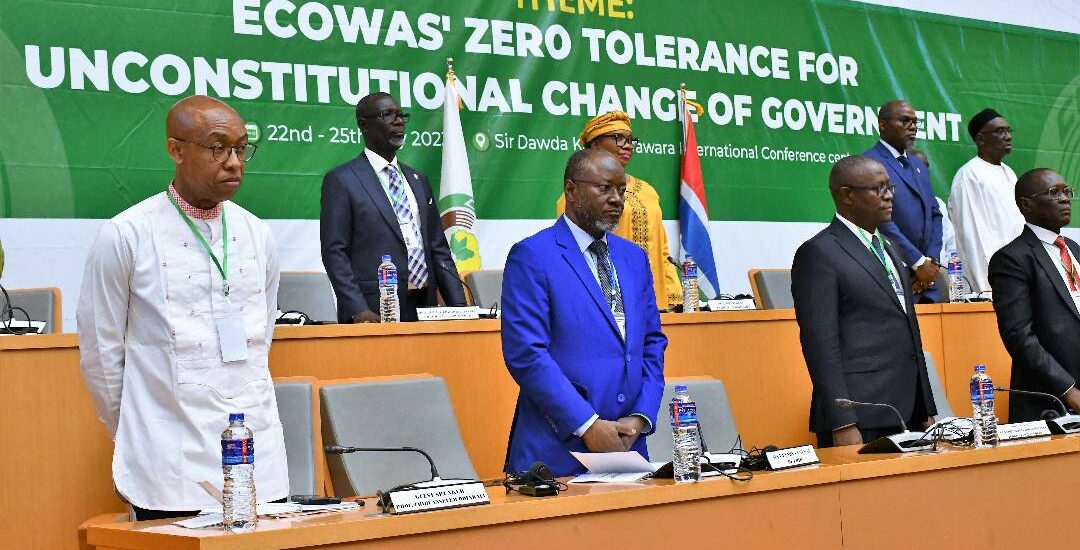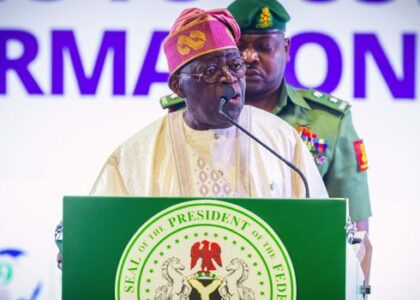Introduction
As part of its activities, the ECOWAS Court of Justice organises and hosts an annual international conference in any selected member State. The international conference provides a forum for the Court to, in conjunction with scholars, jurists, bar associations, and stakeholders from member States, examine important and topical legal thematic issues. The 2023 international conference, titled, “ECOWAS’ Zero Tolerance for Unconstitutional Change of Government”, was held in Banjul, The Gambia, from 22nd to 25th May, 2023. It focused on the scourge of unconstitutional change of government (UCG), especially military rule, which appears to be resurging in the ECOWAS region. The timely provision of a forum to deliberate on this very important matter of concern marks a strong contribution of the Court to the urgent need to stem the tides of coup d’etat from spreading beyond those recently experienced in the Republic of Mali, Guinea and Burkina Faso.
The importance of this conference, apart from providing a forum for appraising the progress and challenges in the ECOWAS integration scheme, it also provides a forum for sincere and honest rapport between the Judges of the ECOWAS Court and the Judges of courts of member States. Apart from the Chief Justices of the Supreme Courts of Liberia and Sierra Leone, who moderated a section each, there were Judges from national courts of several other member States. The conference thus provides opportunity for the conference to hear from national Judges and gain understanding of their attitude towards the ECOWAS Court.
Opening Ceremony
The opening ceremony was well attended by officers of State, officers of Institutions of ECOWAS, members of the Diplomatic and Consular Corps, Presidents of Bar Associations, including the African Bar Association, International Development Partners, members of the Academia, distinguished Resource Persons and Participants, Staff of the Community Court of Justice, the Media, Civil Societies, and Students. Some of the dignitaries were, His Excellency, the President of the Republic of The Gambia, President Adama Barrow, represented by the Vice President of the Republic of the Gambia, H.E. Muhammed B.S. Jallow. Also in attendance for the Republic of The Gambia, were the Chief Justice Hassan B Jallow; the Attorney General & Minister of Justice, Hon. Dawda A. Jallow; the Minister of Trade, Industry, Regional Integration and Employment, Hon. Boubacarr Ousmaila Joof; and other Senior Officials of the Government of the Republic of The Gambia. From the ECOWAS Institutions, were His Excellency, Dr. Omar Alieu Touray, the President of the ECOWAS Commission, represented by the ECOWAS Resident Representative to the Gambia, Ms. Miatta Lily French; Heads of other ECOWAS Institutions and Agencies; Hon. Justices of the Community Court of Justice; Presidents of Regional Courts; Supreme Court Justices of members States; and Heads of ECOWAS National Offices in the Member States.
Opening Address of the President of the Court
In his welcome address, the President of the ECOWAS Court, Hon. Justice Edward Amoako Asante, highlighted the negative impacts of UCG and the gains made over time by ECOWAS in restoring democratic governance and culture, the rule of law, protection of human rights and the promotion of the regional integration agenda. He called on member States to work collectively to prevent UCG and punish perpetrators.
Goodwill Messages
In his goodwill message, the Hon. Speaker of the ECOWAS Parliament, Dr. Sidie Mohamed Tunis, noted that the Court and the Parliament are indispensable partners in the program of regional integration and this is why the ECOWAS Parliament is aligned with the Court on the theme of the Conference. He also noted that despite the legal framework on UCG, there is a resurgence of military interventions in politics in West Africa and these are violations of the Protocol A/SP1/12/01 on Democracy and Good Governance, Supplementary to the Protocol relating to the Mechanism For Conflict Prevention, Management, Resolution, Peacekeeping and Security, 2001. He further highlighted that perpetrators of UCG often blame violations of national constitutions by incumbents, bad governance, insecurity, lack of free and fair elections, for their unlawful act of UCG. He highlighted the need to address the root causes of UCG by nurturing the right political governance, ensuring separation of powers and independence of institutions. He concluded by reiterating the commitment of the ECOWAS Parliament to play its role in addressing the problem.
In his statement, the President of the ECOWAS Commission reiterated the Commission’s commitment to the policy on zero tolerance for UCG within the Community. He however regretted that ECOWAS is expending enormous resources that could have been used in other areas for the benefit of the Community, to restore democracy in member States that have experienced UCG. He underlined the need for practical preventive measures as a tool for addressing UCG.
In his Opening Statement, given by the Vice President of the Gambia, H.E. Muhammad B.S. Jallow, on behalf of the President, he noted that democracy is about respecting the constitution even when it is not convenient. Also, that democracy demands respect for human rights and the opportunity for all to be heard. His Excellency expressed his conviction that the ECOWAS zero tolerance for UCG sends a message that democracy is a must, and should not be a mere slogan but a means for real civic engagement with the citizens. He called for the strengthening of legal frameworks and institutions as a means for guaranteeing constitutional order.
There were also goodwill messages from the Chief Justice of The Gambia, His Lordship Hassan B. Jallow; Minister of Trade of The Gambia. Hon. Boubacar O. Joof; The Attorney General and Minister of Justice of The Gambia, Hon. Dawda A. Jallow; ECOWAS Auditor General, Dr Joao A.M. Fadia; Director General of GIABA, Mr. Edmond W. Harris; the President of EBID, represented by the Secretary General, Mr. Moctar Coulibaly.
Keynote Address
Delivering the keynote address,titled, “Zero Tolerance for Unconstitutional Change in Government in (West) Africa: Democracy and Rule of Law for Sustainable Development”, Professor Chidi Anselm Odinkalu remarked that addressing UCG is of “monumental salience” for the sub-region and for Africa and described West Africa at, arguably, “the epicentre of this ‘global epidemic’” of UCG.
The keynote Speaker drew attention to the African Union reports showing that the AU declared a total of fourteen (14) instances of UCG, since 9 July 2002, when it was established, in the following ratio: three in North Africa, seven in West Africa, one in East Africa, one in Southern Africa and two in Central Africa. He further informed the conference of the reports that there have been 169 “military interventions of some type” in 16 West African Countries (including Mauritania) in the half Century from 1 January 1955 to 31 December, 2004, and that Cape Verde is the only country that has not had a significant coup incident. He also recalled the report that as at the beginning of 2022, there were 486 attempted or successful coups carried out around the world, since 1950, with Africa accounting for a staggering 214 (44.03%), of which 106 (43.8%) were successful and 108 (44.26%) were unsuccessful. On a State by State basis in the continent, Prof Odinkalu noted that Sudan accounts for the highest number of attempts with 17 (both successful and unsuccessful), while Burkina Faso accounts for the highest number of successful coups as well as the highest success rate of eight of the nine attempts succeeding. He further stated that of the top ten countries in Africa with the highest number of coup attempts and successful coups, only three – Comoros, with nine (four successful); Burundi, with 11 (five successful); and Sudan, with 17 (six successful) – are not in West Africa. Of the remainder, Ghana and Sierra Leone, have had ten coup attempts each, which resulted in five changes of government in each; Guinea-Bissau, Mali, Benin, and Nigeria have each had eight coup attempts with success rates of four, five, six, and six, respectively. Togo has reported three successful coups from seven attempts.
After reeling out the numbers, the keynote Speaker provided a robust discussion on UCG. He discussed the approaches adopted by ECOWAS to UCG; highlighted the negative impacts of UCG, and made useful recommendations.
It is important to observe that the number of times some of the countries mentioned have had incidents of coup, does not give a complete picture of the length of military rule in the countries. Some Countries, such as Togo, that has had only three coups, has been under a sort of military rule than some of the Countries that have had successive coups. In any event, it is difficult to see, in real term, how a civilian rule maintained by the force of arm and military repression conforms with the democratic will of the people. There was, in fact, consensus of opinion on this at the conference plenary.
Conference Subthemes
During the four days of the conference, background papers on the seven subthemes of the conference were delivered and discussed. The subthemes were: (a) “rule of law, democracy and good governance: ECOWAS constitutional convergence principles in perspective”; (b) “ECOWAS mechanism for conflict prevention, management, resolution, peace keeping and security”; (c) “human rights as a factor for democracy, peace and security: duty of member states, to respect, protect and fulfil human rights”; (d) “lack of free, fair and transparent elections as a key source of conflict: holding member states accountable for their treaty obligations and the sanctions regime”; (e) “lack of free, fair and transparent elections as a key source of conflict: holding member states accountable for their treaty obligations and the sanctions regime”; (f) “the enabling legal environment for ECOWAS integration: ECOWAS Community law in perspective”; and (g) “an appraisal of the judgment enforcement mechanism of the ECOWAS Court of justice”.
The resource persons who presented background papers are the Hon. Justice Dr. Abou Bhakarr M. Binneh-Kamara J. Justice of Sierra Leone’s Superior Court of Judicature; Justice Dr. Richmond Osei-Hwere, Justice of the High Court of Ghana; Femi Falana SAN; Prof. Joy Ngozi Ezeilo, OON, SAN; Prof. Amos O Enabulele; Professor Kossi Mawuli Agokla; Dr. Tony Luka Elumelu, Ag. Director, Private Sector, Ecowas Commission; Janet R. Sallah-Njie, Commissioner, African Commission on Human and Peoples’ Rights; Prof Solomon T. Ebrobrah; Prof. Raymond A. Akutugba; N’Draman Kablan Fidele Amilcar, Judge at the Court of First Instance of Abidjan (Cote D’ivoire); Prof F.C. Nwoke; Prof Kofi Abotsi; Ladislau Clemente Fernando Embassa, Judge of the Guinea-Bissau Supreme Court of Justice and of the West African Economic and Monetary Union (WAEMU) Court of Justice; Mr. Anthony Anene-Maidoh, Former Chief Registrar, Community Court of Justice, ECOWAS; Prof. Muhammad Tawfiq Ladan; Professor Narey Oumarou; Diana Asonaba Dapaah , Deputy Attorney-General and Deputy Minister for Justice, Republic of Ghana; Dr. Brasca Ifeadi; Paul Ejime, Global Affairs Analyst, Consultant on Strategic Communications, Media, Governance Issues & Elections; Amie N.D Bensouda.
Closing Ceremony
At the closing ceremony, on 25th of May, 2023, the President of the Court gladly announced that the government of The Gambia has notified the Court of the appointment of a competent national authority for the implementation of judgments of the Court in The Gambia. Importantly, the Government of The Gambia was commended at plenary for being the only member State with a 100% compliance with the judgments of the court against The Gambia. Whereas, the general compliance rate, according to the President of the Court, is regrettably less than 30%. To address this negative situation, the President urged member States that are yet to appoint a competent national authority to do so. This is in line with the provision of article 24(d) which provides that “[a]ll Member States shall determine the competent national authority for the purpose of recipient and processing of execution and notify the Court accordingly”.
The President also urged member States to domesticate the Revised Treaty to give the requisite normative status to ECOWAS legal regime in the national spheres of member States.
©Centre for Community Law, May, 2023









